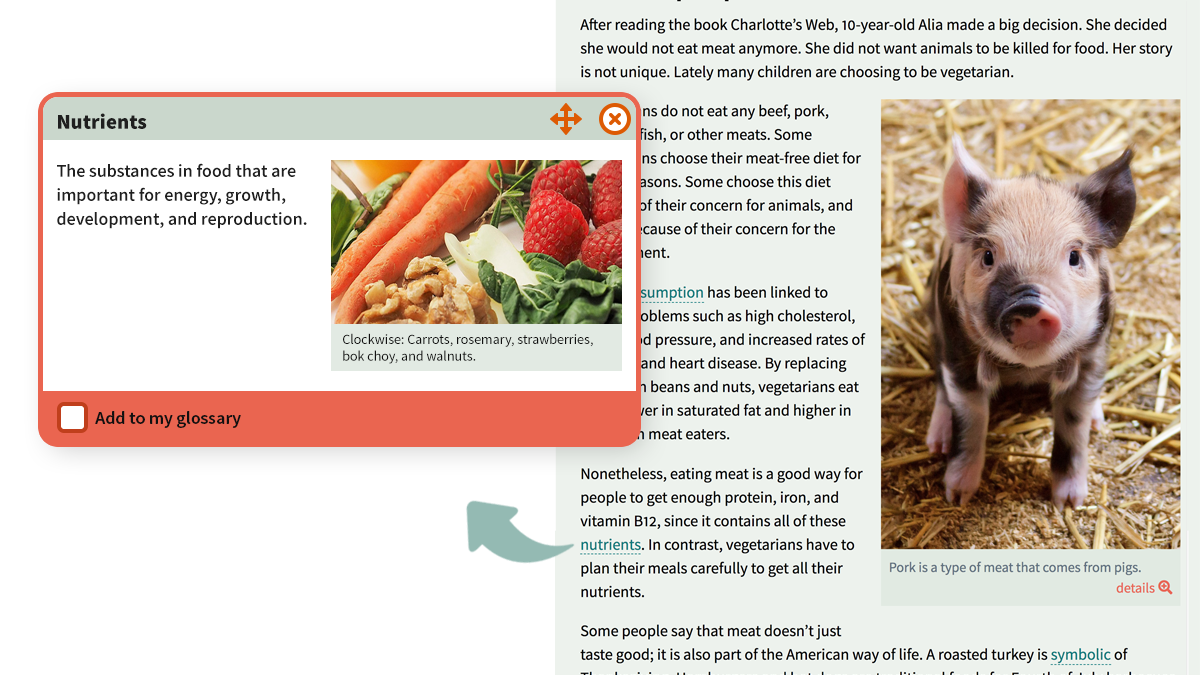Glossary
Glossary and dictionary features provide ways for readers to immediately gain understanding of unfamiliar words. Readers can access definitions of words directly within the text. These embedded definitions can support readers' retention of information.
While both Glossary and Dictionary features provide definitions, they have some key differences. Glossary features highlight key words that are chosen based on the learning goal of the material. The definitions in a glossary can be customized to match how the word is being used in the text. Dictionary features allow users to look up any word, leaving it up to the reader to decide which words to look up. Dictionaries provide traditional definitions of the words, not contextualized ones like in the Glossary.
See how we’ve used a Glossary to clarify words in Clusive.

Glossary and Dictionary features allow readers to access definitions of words within the text.
Research
- Digital dictionaries may support children’s vocabulary development. In a study of 288 children ages 4 to 6, researchers randomly assigned some children to use an ebook with a digital dictionary, and some children not to. The digital dictionary explained some words but not others. Compared to children who did not use the ebook, children who used the ebook showed greater gains in understanding the meaning of words included in the digital dictionary. The two groups had equivalent word-meaning scores for words that were in the ebook but not not supported by the digital dictionary. This suggests that the dictionary, and not the ebook more broadly, led to improved understanding of word meanings.
- Digital dictionaries may improve learning outcomes for English language learners.
- A randomized study of 95 English learners found that participants retained more information when using an electronic English dictionary than when using a print English dictionary. Print vs. electronic dictionary formats did not affect participants' language reception or production.
- A study of 44 English learners ages 18-30 found that compared to using a paper dictionary, using a computerized dictionary shortened reading times, increased the number of words looked up, and increased vocabulary recall. Reading comprehension did not differ between the two dictionary types.
Related Guidelines
The features of the CISL tools are related to existing guidelines and best practices, including the Web Content Accessibility Guidelines (WCAG) and the Universal Design for Learning (UDL) Guidelines. The feature of adjustable letter spacing is connected to:
Web Content Accessibility Guidelines (WCAG)
- To meet WCAG level AAA, definitions of “unusual” words or phrases (such as jargon and idioms) should be available (WCAG 2.1 AAA Criterion 3.1.3), as well as the expanded form of abbreviations (WCAG 2.1 AAA Criterion 3.1.4)
Universal Design for Learning (UDL) Guidelines
- UDL Checkpoint 2.1: Clarify vocabulary and symbols
- UDL Checkpoint 3.1: Activate or supply background knowledge
- UDL Checkpoint 3.2: Highlight patterns, critical features, big ideas, and relationships
Glossary or Dictionary features in other work
Want to see what other projects are doing with Glossary or Dictionary features? See what Raising the Floor has compiled on their page for the feature, retrieve a definition for any selected word from a glossary/online resource. Check out Newsela for an example of how definitions can be embedded in reading passages.
